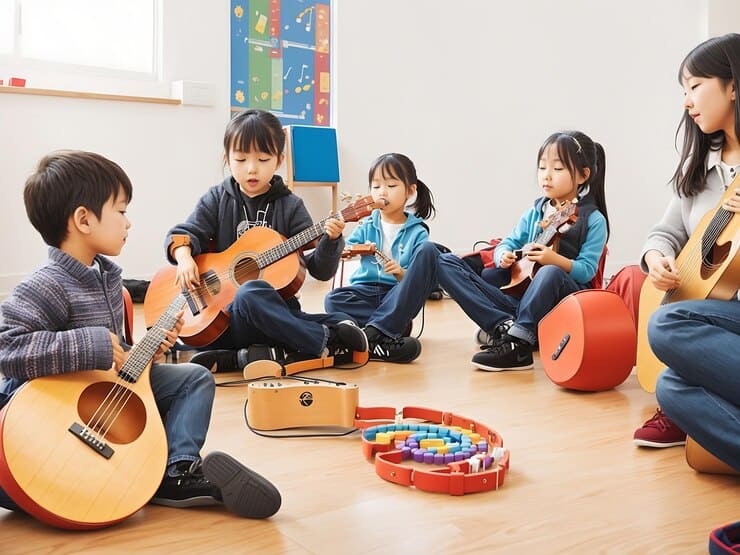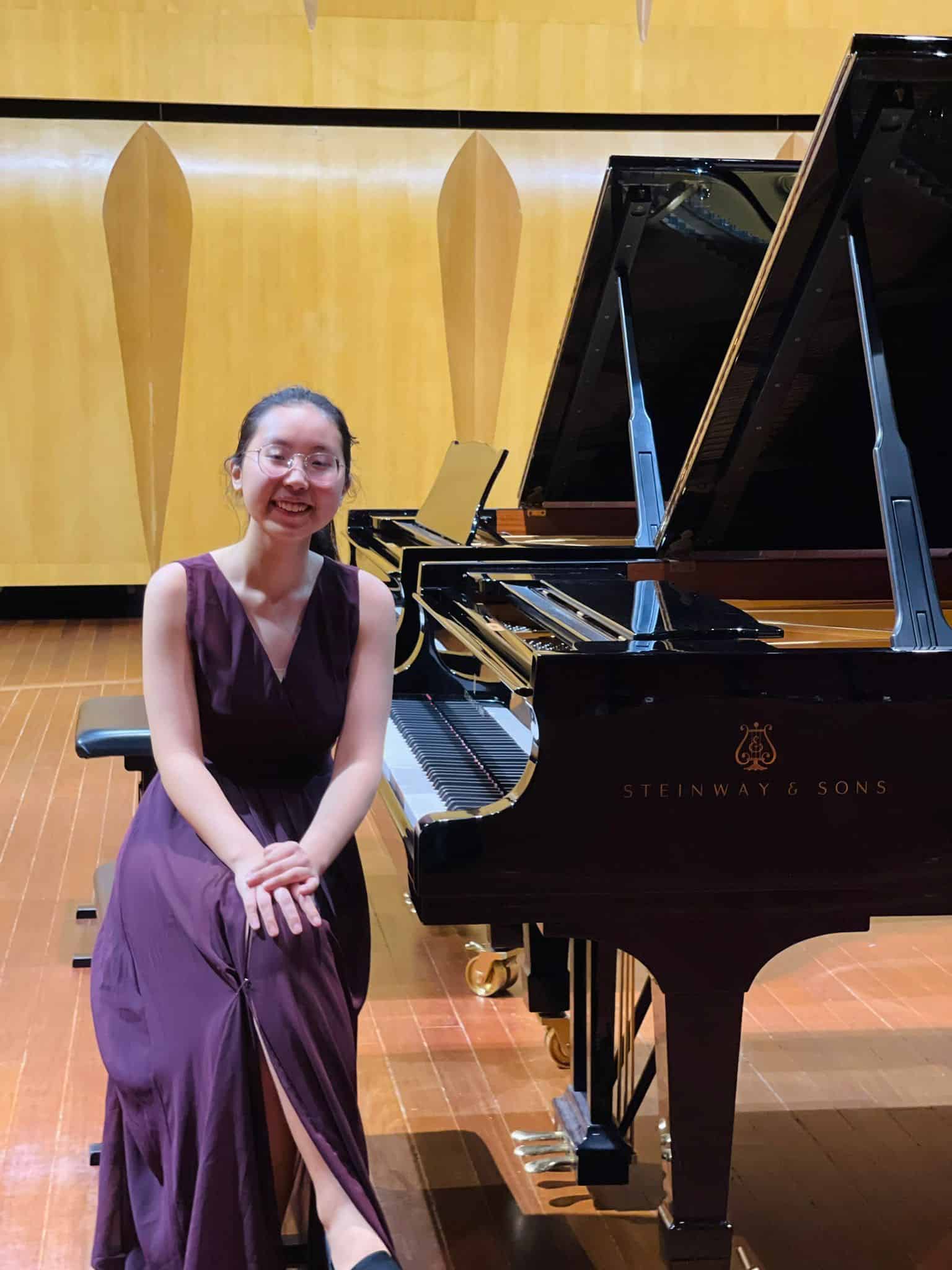
Content > Blogs > Preschoolers > The importance of Music and Movement for Preschoolers
The importance of Music and Movement for Preschoolers
- Written By Fu Jinxia
- Updated on August 31, 2023
Preschoolers love anything and everything to do with Music and movement. Read on to know why Music and Movement is important in child development.

Why is Music and Movement important in child development?
A few years ago, “Baby Shark” landed on the shores of young children and took their world by storm. Just a short snippet of it would send many singing and moving to its catchy tune and beat, stimulating their senses and getting them away from the screen in a tech-savvy society like Singapore!
Early childhood is a rapid time of growth, exploration and discovery. With an estimated one million new neural connections formed every minute during these formative years, the possibilities are limitless if paced with the right resources.
Music is one such art form that has the ability to accelerate brain and language development, along with speech perception and reading skills, according to a five-year study at the University of Southern California’s Brain and Creativity Institute. It is no wonder many preschools in Singapore integrate music and movement activities in their curriculum, along with many other enrichment centres that cater for these activities.
As preschoolers develop, they learn to do new things with their bodies and communicate and express themselves more readily with movement before words. In an intuitive and fun manner, music and movement help preschoolers develop strong muscles, balance, and coordination.
Aside from the physical aspect, music enhances mood and mental health. Soothing music calms and relaxes, while energetic beats rouse energy and excitement. These are just some ways in which music and movement can provide for holistic child development.
Benefits of Music and Movement for Preschoolers
Music and movement activities engage both hemispheres of the brain, generating new pathways that contribute rapidly to a child’s cognitive functioning. With the complex constitution of music, a child is doing many things while listening to music – he is subconsciously training his auditory memory, distinguishing between pitches, and listening to different elements of music selectively.
A study conducted by the University of Queensland of over 3,000 two & three-year-old children found that informal music-making at home (such as making up silly songs or exploring instrument sounds) improved attention, numeracy, and prosocial skills more than reading. Music and movement activities give preschoolers a headstart in their brain development, propelling them further in their future studies.
Music for young children is usually repetitive and tailored for them to learn vocabulary, grammar and pronunciation, building up their language and speech. Through catchy and engaging tunes, preschoolers will be able to remember and retain the lyrics more effectively, making it a powerful tool to teach English, Mother Tongue, or even a third language!
Aside from these language aspects, preschoolers are also given the opportunity to develop and practice pre-language skills. This includes imitation of actions, eye contact, vocal play, understanding timing, attention, listening, and non-verbal language.
The benefits of music and movement for preschoolers are endless, but another addition to the list would be the development of motor skills. Think about the lyrics of the song ‘Hokey Pokey’:
Within a short span of two minutes, it’s almost a full body workout for children, from using their large muscles to move their bodies (squatting, jumping, marching) to using the small muscles in their hands to move an egg shaker to moving their bodies in different directions and coordinating movements with instructions.
The best part is, you don’t have to nag at them to follow commands because they just can’t help themselves from dancing and singing along to the music!
Music and Movement Activity Ideas
You don’t have to be Mozart or Beethoven to engage your child in music and movement activities. Here are some simple activity ideas!
Dance Party
A good starting point could be getting your child to move to the beat of his favourite nursery rhythm and experimenting with different body parts (stomping feet, clapping hands, touching shoulders). Invite more friends to join this party, and throw action songs like “Freeze Dance” or “Shake your Sillies Out” for more fun and laughter. Children could also dance to music with scarves to songs like “Jiggle Your Scarf”.
There are also classes like Rhythm in Me, which has a music and movement programme where toddlers celebrate by singing and dancing to their favourite tunes, along with plenty of instruments and games.
You can also Read : 10 music schools in Singapore suitable for kids of all ages, levels, and interests.
Instrumental activities
If you are feeling more adventurous, try making a simple shaker or drum to engage the finer muscles of your child. Shake or drum it up to action songs such as “Shaky, Shaky Egg” and “Sounds in the Woods”. Change up the volume (loud or soft) or speed (fast or slow) to add more variety and laughter! Other instruments commonly explored in music and movement activities are handbells, xylophones, boomwhackers and sound shapes.
As an introduction to musical instruments, check out the musical playground at Gardens by the Bay, with tuned drums, chimes and xylophones for all to try.
Music and movement activities help preschoolers develop various learning domains, giving them an edge. This could also be the prelude to them picking up an instrument in the future, gaining them a new skill and a creative, expressive outlet. Be it a valuable tool in the Direct School Admissions to secondary schools in Singapore or opening up the pathways of social interactions through joining a music ensemble as a Co-Curricular Activity in formal schools, an additional skill is always good to have.
For a start, music and movement classes are an excellent opportunity for parent-child bonding time (in accompanied classes), (or a just temporary break from the stresses of parenting). Either way, there is nothing to lose and everything to gain!
To know more about Parent accompanied classes, Read our Article – Best parent-accompanied classes for preschoolers in Singapore.
Explore Klassbook for more Classes
To explore more music classes, go through our list of subjects here. Why not start with a trial class to gauge your child’s interest?

A musician at heart and a pianist by training, Lauren Fu is an active educator and performer in the music scene. Having taught a wide range of students from 4 to 60 years old, she strives to inspire others through her teaching and love for music! She believes in the transformative power of the arts and seeks to express herself through various art forms, be it performing, composing, or writing.
In this Article
Loved Our Articles? Subscribes To Get Updates Directly To Your Inbox!
Related Articles


Is your child learning to play Piano in Singapore? Let’s see what their Journey looks like.
October 30, 2023
Tuition Centre vs Private Tuition: Which Is Right For Your Child?
October 28, 2023
10 Holiday Camps For Year-End School Holidays In Singapore
October 25, 2023
SYF and Other music competitions in Singapore
October 23, 2023
